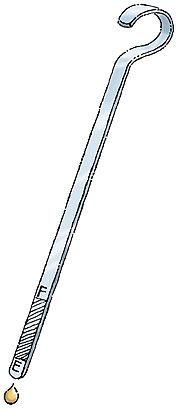Oil change

The end (of cheap oil at least) is near. Only a dipstick would argue that we're ready for it.
ENERGY POLICY WONKS OF THE RECENT PAST once fantasized of federal tax hikes driving gas prices as high as $4 or $5 a gallon. The idea was that the hefty price bump would discourage careless fuel consumption—you know, like driving "cars" that get 10 miles per gallon—as it generated revenue to invest in alternative fuels and build a new energy infrastructure.
This was a proposal so reasonable and proactive it didn't have a chance to succeed in Congress. The starry-eyed gas taxers were politically immolated by free-market zealots who resisted any tinkering with the mysterious machinations of the all-powerful, all-seeing eye of holy commerce.
Now the omniscient free market in its divine-ish wisdom has decided to bumrush U.S. consumers into the era of $4- or $5-a-gallon gas (as the price of gasoline is projected to be by the end of this summer) with essentially nothing positive to show for that excessive rate: no alternative fuel development, no new energy infrastructure in place, and no reduced pollution from cleaner-running, higher-mileage vehicles. That's some wisdom in that free market.
U.S. oil consumption flows at an irresponsible pace even as China and India pile on new energy demand and those nations that host the world's oil reserves or serve as its transit points look increasingly unstable. Even if vast new reserves are found and tapped, the oil sands of Canada squeezed dry, and the poor moosies driven from the tundra by new drilling in Alaska, the era of cheap oil appears to have ended. But that's precisely why a higher federal gas tax still makes sense.
Free market economists talk a lot about rational consumers and how their judicious choices shape our economy and our lives. But there's little rational about our current energy policy and many of the choices our Humvee-happy fellow citizens have made. A truly rational energy policy would take a holistic look at how we use energy in the U.S. and at its true costs to the environment, to our children, and to our Gross National Product.
If the true costs of cheap oil showed up at the pump, we would all understand that we already pay too dear a price for our oil gluttony. Our oil addiction, as the president himself has described it, requires U.S. citizens to tolerate fossil fuel's ongoing environmental degradations (and the resulting impact on life expectancy) while it claims an ever-larger share of our tax dollars in the form of a Pentagon budget bloated by additional costs aimed at protecting the global oil infrastructure.
Our national gas problem has led to political intrigue and outright military adventures in the Middle East that have proved costly in both human and national treasure. The U.S. had contingency plans to invade Saudi Arabia during the Arab Oil Embargo of 1973, has twice invaded Iraq, and now apparently is laying the psychological and diplomatic groundwork for an assault on Iran. While other geopolitical factors guide our too-frequently short-sighted role in this region, what cannot be disputed is that the U.S. would have had little to do with any of these sand-blown nations if they were producing olive oil instead of petroleum.
The too-easy dismissal of gas tax proposals over the years represents historic—and now costly—missed opportunities, but it is not too late to reformulate a real energy policy that gets a little closer to truly rational gas consumption. The current 18.4 cents per gallon federal tax, unchanged in more than 10 years, essentially pays for the upkeep and expansion of the federal highway system. New revenue will be needed to prepare for an oil-scarce future.
Annually Americans log almost 3 trillion vehicular miles while burning about 170 billion gallons of fuel, covering a vast wasteland of energy profligacy. A federal tax hike of $1 a gallon would raise as much as $130 billion per year—slightly more than the $100 billion profit oil companies captured in 2005—while it promotes oil conservation, shows good stewardship of the gifts of creation, and bankrolls judicious investments in a post-fossil fuel future.
Or we could just use the new revenue to pay for the war.
You think $4 or $5 dollars is too much to pay for a gallon of gas? Ask the family of a Marine killed in Falluja or of an Iraqi child collaterally damaged by an American bombing raid how much is too much. Their suffering is the ghoulish price we tacitly accept as the bloody guarantor of our oily standard of living.
Personally I'd rather pay at the pump.
Kevin Clarke is a senior editor at U.S. Catholic and managing editor of online products at Claretian Publications. This article appeared in the July 2006 (Volume 71, Number 7; page 38) issue of U.S. Catholic.
